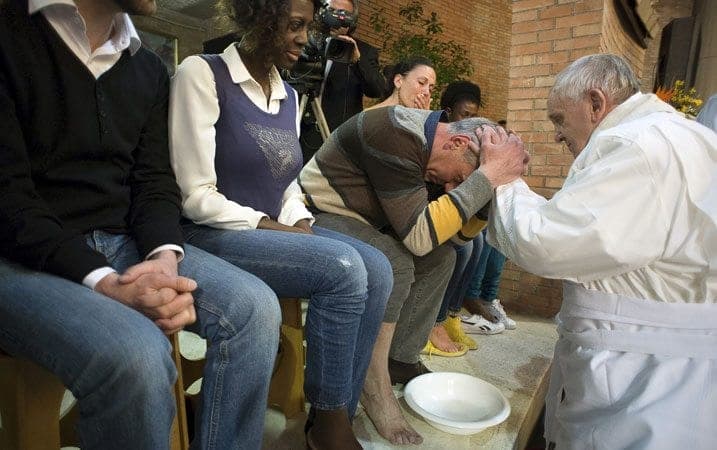If you’re looking forward to seeing women and girls take part in the Holy Thursday foot-washing ritual in your parish — now that the pope has said it’s okay to include them — hold on. The decision has inflamed the so-called liturgy wars, and appears to be the latest in the Catholic right’s dissatisfaction with Pope Francis.
Reaction to the pope’s decision that a wider spectrum of people be included in the ritual to reflect the entire community was fast and furious from some Latin Mass enthusiasts and folks disenchanted with liturgical changes arising from Vatican II.
Francis himself has already included women in the ritual, which is based on the story of Jesus washing the feet of his 12 apostles, every year since his 2013 election as pope. As some noted Thursday, the situation boils down to the pope:
They criticised @Pontifex for breaking the rules when he washed women's feet. So he changed the rules. https://t.co/oWv7LrJfK0
— Austen Ivereigh (@austeni) January 21, 2016
But this change shouldn’t cause major waves in the United States, as many bishops here have permitted priests to include women in the service for decades, and the US Conference of Catholic Bishops gave the practice its tacit approval in 1987.
Not all bishops have permitted the practice, however.
Bishop Robert C. Morlino of Madison, Wisconsin, for example, continued to prohibit women from being part of the ritual—until yesterday.
And while he said in a Thursday statement that he accepted the pope’s new rule “with loving obedience,” he pointed out that priests could stick to business as usual, or even drop the ritual altogether if they didn’t want to include women.
Priests in his diocese have the option “to include women in the washing of the feet … to follow the traditional practice of washing the feet of men, who in this dramatic ritual represent the Twelve Apostles [or] to omit the ritual of the washing of the feet altogether.”
Some priests seem to be gravitating toward door No. 3.
“Thankfully it is optional. So I will never perform the rite again,” the Rev. Bede Rowe, a priest based in the United Kingdom, wrote on his personal blog.
Another British priest, the Rev. Ray Blake, wrote on his blog that he stopped doing the ritual in 2013, when Pope Francis chose to include women and non-Christians in the ceremony. And he won’t start it up again.
“Here, since the ambiguity of the Pope’s first Holy Thursday and my own increasing inability to get up and down 12 times, it really does hurt, I chose not wash feet then and haven’t done since,” he wrote Friday.
Other conservatives worry that the changes could lead to women’s ordination. They point to the symbolism of the ritual, which many interpret as Jesus washing the feet of his 12 apostles.
https://twitter.com/michaelbd/status/690199589635411968
Joseph Shaw, head of the Latin Mass Society of England and Wales, agreed.
In a statement released Thursday, he wrote that the change “reinforces the trend which has seen priests increasingly surrounded by women during Mass, serving, doing the readings, and as Extraordinary Ministers of Holy Communion.”
“This inevitably makes the all-male priesthood itself harder to understand,” he said.
Francis has consistently said women’s ordination is off the table, suggesting that Pope John Paul II’s teaching on the matter is infallible, meaning he does not have the power to change the rules.
Shaw also fears that including women could be viewed sexually.
“An important aspect, which is generally neglected is the question of the etiquette of men washing the feet of women,” he wrote. “This would have been considered inappropriate only a few decades ago in the West, and such a view persists in many cultures.”
The Rev. Kevin M. Cusick, pastor of St. Francis de Sales Church in Maryland, concurred:
Exactly the reason why it's inappropriate for priest to wash women's feet; unless she's his "girlfriend" https://t.co/K9TgKMhmy9
— Fr. Kevin M. Cusick, LCDR (Ret.)🇻🇦 (@IntroiboAdAltar) January 21, 2016
For his part, Madison’s Morlino hopes that whatever priests in diocese decide to do, that they aren’t pressured from either side in this latest salvo in the liturgy wars.
“It is my hope that in their outstanding care for the people entrusted to them, the priests will engage serious prayer and reflection in coming to their choice of option,” he wrote. “It is also my hope that our priests and people will avoid any pressure tactics so as to allow our priests to make good and prudential decisions.”


















